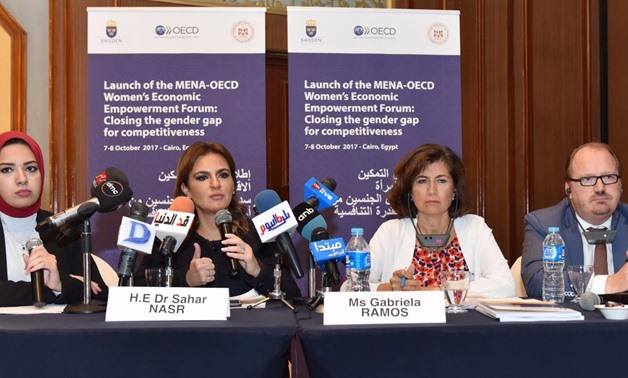
Minister Sahar Nasr and the OECD Chief of Staff and Sherpa to the G20 Gabriela Ramos during the OECD-MENA forum on Oct 7, 2017
CAIRO – 7 October 2017: “To achieve gender equality, the way of business management must be changed so as women would be treated based on merit, performance, and results,” Minister of Investment and International Cooperation Sahar Nasr said.
“Women must believe in themselves and outperform men,” she added.
Her comments came as a response to Egypt Today’s question if setting quotas for women in different enterprises would contribute in boosting women’s economic participation.
The minister said that women must prove themselves to employers rather than forcing them by law to hire or promote women.
“Men and women must be empowered to fulfill both their professional and family duties,” Nasr said during the OECD-MENA forum on women empowerment held in Cairo Saturday.
The OECD Chief of Staff Gabriela Ramos pointed out that although quotas were effective in some countries, they are not enough because there have always been “hidden ways” to discriminate against women.
Ramos added that women have been mostly responsible for child care worldwide, referring to the fact that many employers refrain from hiring women assuming that fulfilling their family duties might negatively impact their professional performance.
She attributed this assumption mostly to the private sector describing it as “lagging behind”, while praising the public sector for being quite “open-minded” regarding hiring and promoting women to key positions.
Ramos also shed light on the fact that women may often choose low-paying professions. She suggested that a support system must be enacted for women to significantly participate in the decision-making process.
Minister Nasr said that 12 percent of the applicants to the microfinance program “Your Idea is your Enterprise” are women and that the ministry is currently studying why the percentage of female applicants to microfinance programs in general is low.
Such small number resulted in establishing a “unified window” for women to accomplish all procedures for micro and small enterprises.
Among the most encouraged elements to empower women in all countries is education, Ramos said, adding that an easy access to the judicial system is very crucial to decrease the gender gap.
“Women must participate in all industries and not just food and clothing,” Asma Alosta, the Libyan Minister of Women Affairs and Societal Development, said.
Following the opening ceremony of the forum, ministers from the countries studied in a report on women empowerment, recently issued by OECD, delivered speeches to shed light on the challenges and measures taken to minimize gender gap.
Ramos said that researchers focused on the economic aspect of gender gap in the report titled “Women’s Economic Empowerment in Selected MENA countries: The impact of legal frameworks in Algeria, Egypt, Jordan, Libya, Morocco and Tunisia.”
However, officials in those countries are the most aware of the societal context, and thus the most capable of orchestrating reforms, she added.


Comments
Leave a Comment